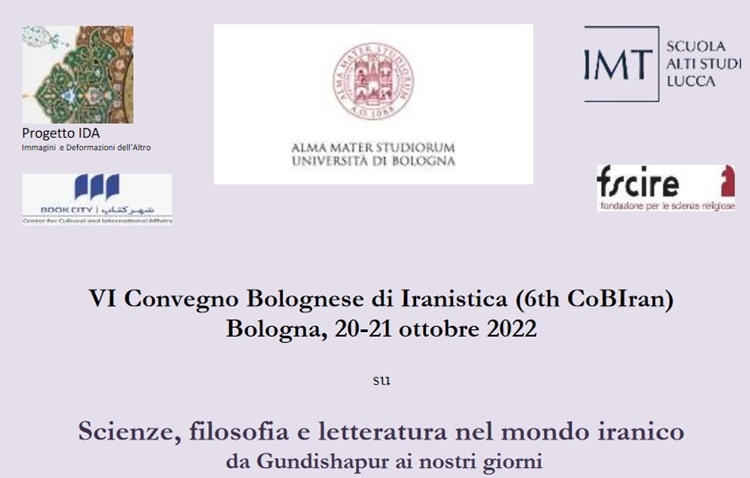
The Sixth Bologna Conference on Iranian Studies, also known as VI CoBIran, is held with a focus on science, philosophy, and literature in Iran from Gondishapur until present day. This event is hosted by Department of Language, Literature and Modern Cultures (LILEC) and the Department of Cultural Heritage of the University of Bologna (DISCI) in cooperation with Center for Cultural and International Affairs of Book City, Lucca Italian School and Fondazione per le Scienze Religiose Giovanni XXIII (FSCIRE), as part of the International IDA (Images and Deformations of the Other) project.
International project IDA is the result of collaboration that started in 2018 between professors and researchers of the LILEC Department and the DISCI Department of the University of Bologna.
Carlo Saccone, Amos Bertolacci are the organizing committee members of the conference.
Ines Peta, Bedin Cristiano, Karail Dilşad Den, Hussein Mahmoud, Sobh Nivin, Abbas Djaouida, Aicha Chekalil, Tiddia Fabio, Zakaria Boudhim will present their lectures and papers during the two-day event.
English literature professor at the University of Bologna Maurizio Ascari will be the keynote speaker of the conference.
The topics of the conference will be around academic and scientific ideas in diverse fields of astronomy, mathematics, botany, zoology, medicine; as well as philosophical and religious theories; and logical, rhetorical and linguistic disciplines; reflections of science and technology in poetry; reflections of science and technology in narrative literature; and historiographic and archaeological documentation of the development of science and technology.
at the Department of Modern Languages, Literatures and Cultures, Conference Room, on the ground floor of via Cartoleria 5, Bologna
9.00 Greetings from the Director of the Department of Modern Languages, Literatures and Cultures, Prof. Maurizio Ascari
9.15 Start FIRST SESSION, moderated by Paolo Ognibene and Andrea Piras
9.15 Some Middle Iranian Denominations of the “Astrologers” and their Background, by Antonio Panaino – University of Bologna, Ravenna Campus
9.45 Manichaean Cosmogony and Cosmology and its Iranian Background, by Floriana Marra, PhD candidate – RUB-Universität Bochum
10.15 Sasanian Metallurgy According to Chinese Sources, by Jeffrey Kotyk – Vancouver (Canada) – PhD Leiden University
11.00 The science of the stars at the court of Chosroes: an ancient conference to solve astronomical problems of the time, by Stefano Buscherini – PhD University of Bologna, Ravenna Campus
11.30 Astrological-astronomical elements of Syro-Mesopotamian origin in the religious culture of the pre-Islamic Iranian world, by Matteo Compareti – University of Venice
12.00 From Sogdiano to Sogdianico. Methodological reflections on the language of the Sogdiana and the Sogdians of the diaspora, by Chiara Barbati – University of Pisa
12.30-13.10 Discussion
14.45 start SECOND SESSION, moderated by Nahid Norozi and Carlo Saccone
14.45 Gems, mirrors and cups. Mineralogy, optics and predictive tools between late ancient and Islamic Iran, by Andrea Piras – University of Bologna, Ravenna Campus
15.15 The North Caucasus in the ‘Ḥudūd al-‘Ālam and in the Ašxarhac’oyc’, by Paolo Ognibene – University of Bologna, Ravenna Campus
15.45 The extraction of the hidden waters of Karajī, Persian mathematician of the year XNUMX: a technical treatise between old and new, by Giuseppina Ferriello – ICOMOS (International Council on Monuments and Sites)
16.30 On Risāla dar taḥqīq-i nowrūz by Ismāʿīl Khātūnābādī, by Simone Cristoforetti – University of Venice
17.00 The Library of Aḥmad Beg, Kurdish Amir of the Mokrī: Perspectives for the Study of Turko-Iranian Literary Culture, by Sacha Alsancakli – Lecturer at Inalco / Center de recherche sur le monde iranien, CeRMI, Paris
17.30 Connected visions and counterpoints of the geographical otherness: confronting Safavid and European representations in Iran during the early modern period, by Werner Gaboreau – PhD candidate, Université Sorbonne Nouvelle, Paris
18.00-18.30 Discussion
at the Department of Modern Languages, Literatures and Cultures, Conference Room, on the ground floor of via Cartoleria 5, Bologna
9.00 beginning THIRD SESSION, moderated by Ivana Panzeca and Amos Bertolacci
9.00 A Persian translation of Aristotle’s Metaphysics? Avicenna and his Science Book for ʿAlā al-Dawla, by Amos Bertolacci – Scuola IMT Alti Studi Lucca
9.30 Imagination, skepticism, and sophistry as topoi in Iranian Medieval Philosophy: an examination on Jalâleddîn-e Rûmî’s use of the term hisbân within the Mathnâvî-e ma’navî, its sources and intellectual allegiances, by Víctor Pallejà de Bustinza – Raimundo Lulio Institute, São Paulo (Brazil)
10.00 Henry Corbin and ‘Allāmah Ṭabāṭabā’ī: philosophical dialogue between East and West in the land of Persia, by Fabio Tiddia – ASTREA (Euro-Asian Studies and Research Association, Padua)
10.45 New light on the reception of Avicenna in the Safavid era: the Persian translations of Kitāb al-Šifāʾ, by Ivana Panzeca – FSCIRE (Foundation for Religious Sciences, section of Palermo), University of Palermo
11.15 “Assertions that do not Deserve the Grace of Considering Them”. Reality and Existence in Islamic Thought, by Francesco Omar Zamboni – PhD Scuola Normale Superiore of Pisa and University of Jyväskylä, Finland
11.45 Blind and blind. Persian alloglot inserts in Arabic philosophical literature on denial and deprivation, by Marco Signori – Scuola Normale Superiore Pisa-Scuola IMT Alti Studi Lucca
12.15-13.00 Discussion
14.45 FOURTH SESSION, afternoon, moderated by Nahid Norozi and Carlo Saccone
14.45 Genghis Khan in Abū Bakr’s Qalandarnāma Qalandar Rūmī: a Sufi text in the Crimea of the Golden Horde, by Andrea Amato – FSCIRE (Foundation for Religious Sciences, section of Palermo)
15.15 The Persian contribution to Arab culture in the vision of Aḥmad Amīn, by Ines Peta – University of Bologna
15.45 Stones and waves: for a poetics of matter between Safavids and Mughals, by Stefano Pellò – University of Venice
16.15 Songs and musical elements in Kerman’s mathnavi of Khwāju (XNUMXth century), by Nahid Norozi – University of Bologna
16.45-17.30 Discussion and conclusion of the conference
Leave a Reply